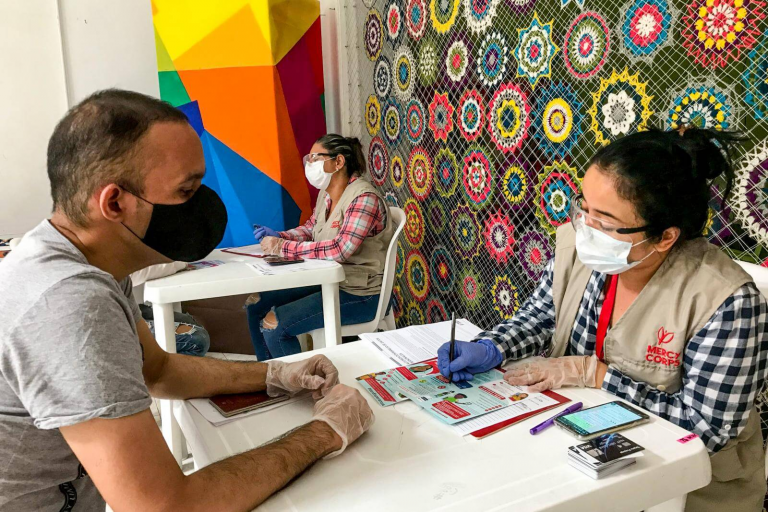Using Technology to Protect Vulnerable Communities

Cisco Blogs | Corporate Social Responsibility
In 2017, Cisco launched a five-year, $10 million partnership with Mercy Corps called “Technology for Impact.” The aim was to combine Cisco’s resources and technology with Mercy Corps’ extensive experience in the humanitarian sector to accelerate scale and social impact. Now in its third year, Tech for Impact has reached nearly seven million people in 29 countries. The partnership has allowed Mercy Corps to test and invest in innovative technologies to deepen their impact, while also building their internal capacity and expertise to advise their 6,000+ staff on ways to introduce and integrate digital platforms into their programs. Now more than ever, we are seeing the tremendous value of, and need for, these technology solutions to continue supporting vulnerable communities during this time. This post comes from Craig Redmond, Senior Vice President, Programs, Mercy Corps
It has long been known that global crises disproportionately impact vulnerable communities: people without access to safety nets or basic healthcare, those facing violence, fleeing conflict, and living in poverty are most at risk. It is sobering to reflect that the UNDP estimates income losses due to the virus could exceed $220 billion in developing countries alone.
Especially at this time, I am honored to be on the leadership team of Mercy Corps, a global humanitarian organization of nearly 6,000 team members on the ground in more than 40 countries supporting the populations who will suffer most.
We are adapting and innovating to meet the urgent needs of the vulnerable communities we serve. Drawing on decades of experience adapting to dynamic crises, the work of building resilience is at the core of all we do. Mercy Corps has responded to almost every global natural disaster in the last 20 years, including the Nepal earthquake, the hunger crisis in the Horn of Africa, the Indian Ocean tsunami and Hurricane Dorian in the Bahamas. We have provided essential support to communities in Liberia and DR Congo during outbreaks of the Ebola virus and helped refugees and internally displaced families in Syria, Yemen, Colombia, and Nigeria to battle the threats of cholera and other water-borne disease. We’ve become an acknowledged expert in disaster response strategies, addressing immediate humanitarian needs while also preparing communities for a sustainable recovery. These complex crises require comprehensive solutions; we tackle challenges from multiple angles and emphasize the interplay between public health, markets and food systems and economic opportunity.
In everything we do, we seek out partnerships—with local governments, forward-thinking corporations, social entrepreneurs and, most importantly, people living in fragile communities, to develop bold solutions that make lasting change possible. Since 2007, we’ve had the privilege of working with Cisco to provide emergency response and economic empowerment programming, always with an eye towards leveraging technology. Together in 2017, we launched a new, five-year initiative to deliver aid and development assistance faster, better and to more people around the world. This partnership with Cisco has truly been transformational for our organization, enabling Mercy Corps to unlock new possibilities and test new technologies new to humanitarian settings.
We weren’t able to predict just how critical this groundwork would be, but the technology foundation we’ve laid through Cisco’s support is informing our COVID-19 response in the following ways:
Delivering trusted, reliable digital information
We are connecting communities and civil society groups to reliable information so they can make informed, local decisions about how to mitigate the health and economic impacts of COVID-19, enhance collaboration, and minimize potential conflict and the spread of misinformation. Country teams are tailoring their approaches, taking into account how their target populations consume and share information.
- For example, in Haiti, we’re sending text and interactive voice messages to 1.5 million Haitians disseminating information about the virus and dispelling rumors, providing tips on hygiene promotion, preventing spread, and reducing stigma associated with the virus. To broaden our reach, we are sharing the same messages with local radio stations, television companies and social media influencers on platforms such as WhatsApp and Facebook.
- Kenya is dealing with the double hit of COVID-19 coupled with an impending wave of destructive locusts. We are providing local governments and United Nation agencies with critical data on locust detection, food supply and virus spread by expanding our existing partnership with Turn.io and WhatsApp to integrate desert locust detection tools and information into a nationwide agriculture and COVID-19 hotline. This innovation turns every Kenyan into part of the detection and response solution, delivering real-time data on critical trends to the Kenyan authorities so they can make informed decisions around managing these crises. Whether citizens are sending in a warning about locust sightings or asking how to identify symptoms of COVID-19, the hotline uses machine learning to respond, process data and direct services to the places they’re needed most.
- Additionally, Mercy Corps has helped install over 150 WiFi hotspots in Colombia, Puerto Rico, Europe, and Uganda that now feature COVID-19 information from local ministries of health and in relevant languages on their splash pages before users are able to connect to the internet. In Uganda, we noticed that people were congregating around the hotspot so we installed a 3G booster to widen the area so that people could access the internet, but still adhere to social distancing guidelines.
Meeting urgent needs
We are supporting families by providing cash, giving them the dignity of choice to meet their urgent needs. With Cisco’s support, we’ve been able to integrate digital cash platforms and participant registration systems to expand our digital cash services.
What does this look like on the ground? As just one example, this week we were able to get cash in the hands of 15,000 vulnerable families in the Democratic Republic of the Congo, so they can buy food and other basic necessities.
Building resilient markets
We are supporting critical market actors including smallholder farmers and small and medium businesses to adapt to the economic impact of the crisis. For instance, Mercy Corps is shifting vocational training programs to digital e-learning platforms, as well as our market-systems support to utilize e-commerce tools. In the Bahamas, we have moved our economic recovery program online to continue to support micro and small businesses recovering from Hurricane Dorian as they navigate the new set of challenges created by the COVID-19 pandemic on a tourism-dependent island.
From responding to meet immediate needs, to preparing to address the devastating impact of economic shocks that will push people further into crisis—there are real opportunities for technology to play a transformational role in tackling this global crisis. We are grateful for Cisco’s continued partnership, which has allowed us to harness tech for good. Just this month, Cisco made a new commitment to Mercy Corps for our COVID-19 response efforts with $1 million to support the delivery of urgent, critical information and behavior change communications, including to 8 million rural families in Africa, as well $2 million towards our COVID-19 Resilience Fund. This incredible gift will enable and enhance the way we help families during this crisis and beyond.

